Last night as darkness fell, Greenwood Cemetery was seemingly deserted, all the employees gone for the day, the gates locked.
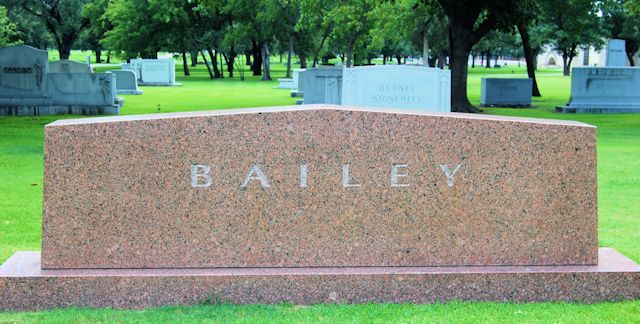 Then, on the south side of the cemetery, a gossamer figure suddenly rose from a grave at a large marble monument engraved with the single word “Bailey.”
Then, on the south side of the cemetery, a gossamer figure suddenly rose from a grave at a large marble monument engraved with the single word “Bailey.”
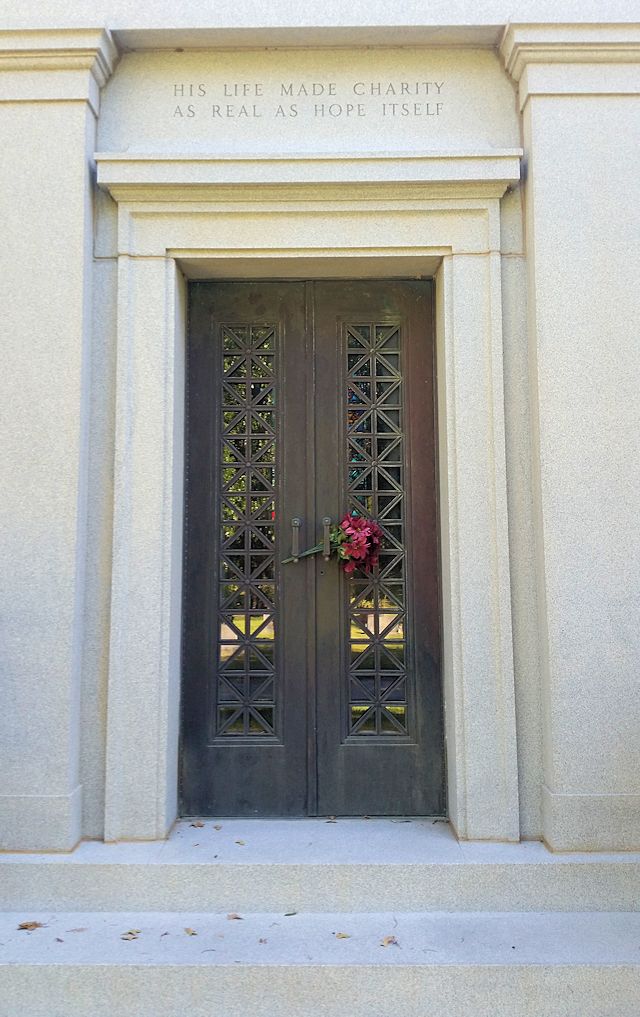 At the same time on the north side of the cemetery another gossamer figure stepped out into the cool night air through the bronze-and-glass door of a cream-colored granite crypt.
At the same time on the north side of the cemetery another gossamer figure stepped out into the cool night air through the bronze-and-glass door of a cream-colored granite crypt.
The two figures walked—without bending a single blade of grass—toward Turner’s Oak in the traffic circle in the center of the cemetery.
The first figure wore a businessman’s conservative suit. The second wore a capacious cowboy hat, fancy cowboy boots, silk bandanna, tailored trousers under monogrammed chaps, and two pearl-handled six-guns in tooled-leather holsters.
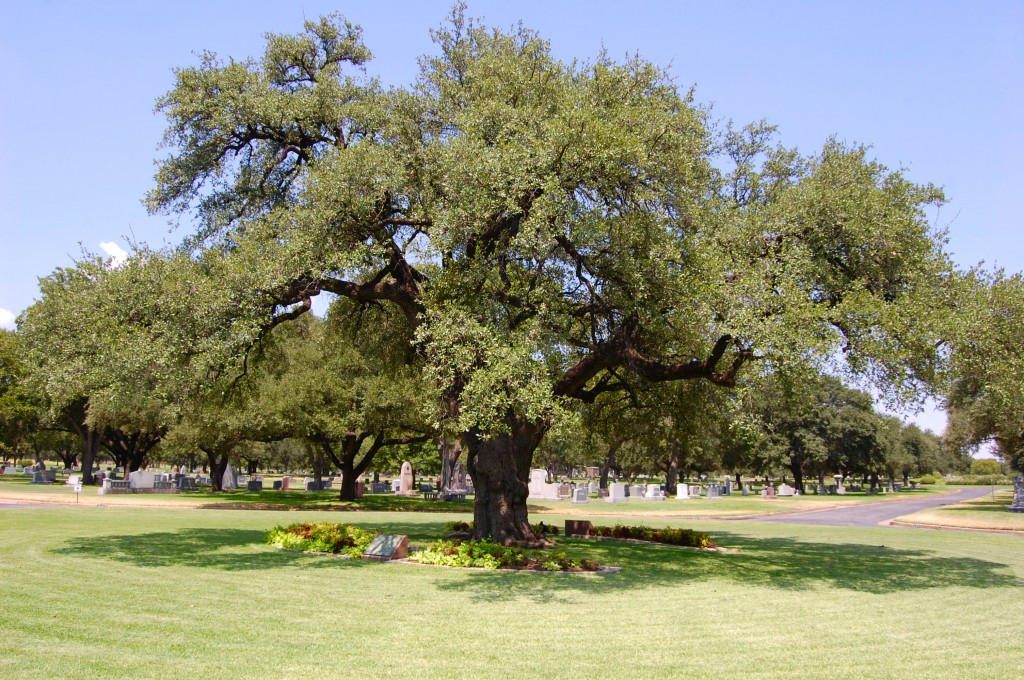 The two figures met under the big live oak tree. They spoke not a word. The businessman turned and stared at the darkening western sky as if anticipating.
The two figures met under the big live oak tree. They spoke not a word. The businessman turned and stared at the darkening western sky as if anticipating.
Soon, as the Evening Star appeared, the businessman put his hands over his ears and nodded to the cowboy.
At that signal the cowboy drew both six-guns and began firing into the air. As he fired he shouted: “Yippie for Fort Worth! Yippie for Greenwood! Yippie for Halloween! It’s time to have a ball, y’all!”
The cowboy was firing blanks. Nonetheless, he was making enough noise to raise the dead.
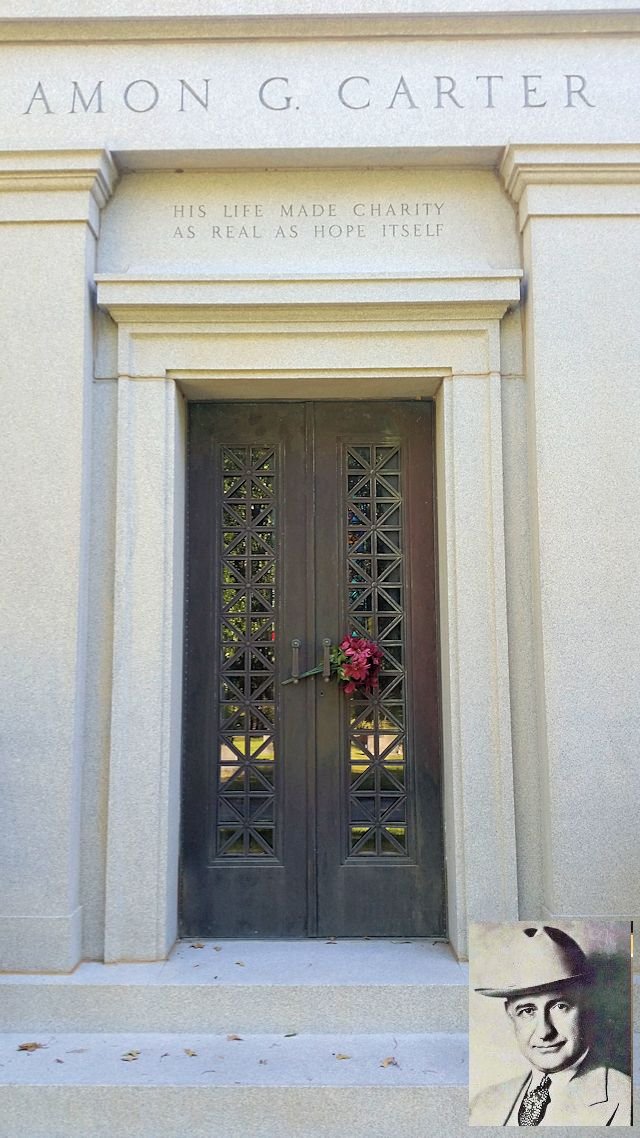 And what Amon Carter wants, Amon Carter gets.
And what Amon Carter wants, Amon Carter gets.
 Across the wooded expanse of the cemetery eighty-two thousand spirits—the population of Greenwood—rose from graves and urns. They stretched and blinked and stared around them. Then they moved, as if commanded, toward the sound of gunfire at Turner’s Oak. The spirits of people who had been buried early in the twentieth century were dressed in shrouds. More-recent burials were dressed in street clothes.
Across the wooded expanse of the cemetery eighty-two thousand spirits—the population of Greenwood—rose from graves and urns. They stretched and blinked and stared around them. Then they moved, as if commanded, toward the sound of gunfire at Turner’s Oak. The spirits of people who had been buried early in the twentieth century were dressed in shrouds. More-recent burials were dressed in street clothes.
If any mortals had been in the cemetery that night they would not have seen the businessman or Amon Carter or the thousands of other residents of that city of the dead. The spirits were immaterial: They had neither mass nor weight. They were invisible to mortals. Even unto themselves they were only translucent: recognizable but ethereal.
The population of Greenwood Cemetery gathered around Amon Carter and the businessman at Turner’s Oak.
The businessman motioned for Carter to cease fire and raised his hands for quiet.
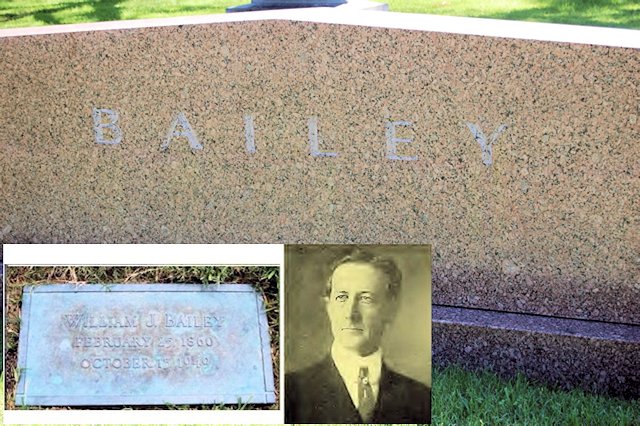
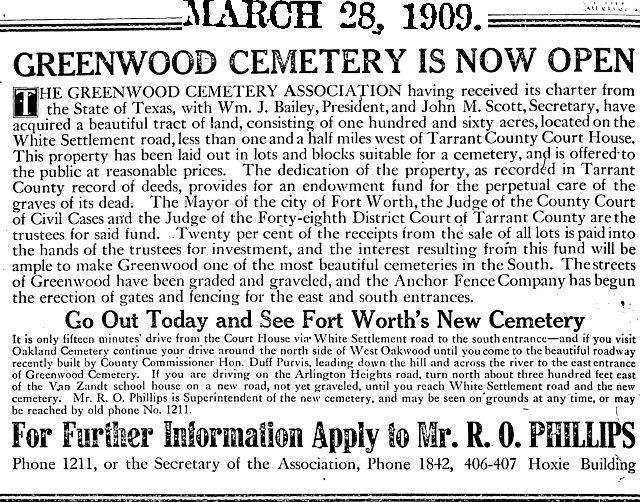 “Good evening, everyone. My name is William J. Bailey. And, like you, I am buried here at Greenwood. In fact, I founded this cemetery in 1909. I owned all the land around here. My house was right over there”—gesturing to the south side of White Settlement Road—“and this”—sweeping his arm over the acreage of the cemetery—“was my front yard.
“Good evening, everyone. My name is William J. Bailey. And, like you, I am buried here at Greenwood. In fact, I founded this cemetery in 1909. I owned all the land around here. My house was right over there”—gesturing to the south side of White Settlement Road—“and this”—sweeping his arm over the acreage of the cemetery—“was my front yard.
“And so tonight I say this to each and every one of you:
“Get off my lawn!”
Bailey threw back his head and laughed for the first time since he had died in 1949. His audience quickly recognized his joke and began to laugh.
The ice was broken.
Bailey: “But seriously, folks, welcome to the Greenwood Halloween Hoedown. Tonight we—”
Amon Carter interrupted: “Or, as I like to call it, the ‘“We May Be Dead, But at Least We’re Not in Dallas” Wingding.’”
More gunshots. Another “Yippie for Fort Worth.”
Bailey, laughing: “You all know this ornery hombre with the six-guns, of course. If ever a ghost needed no introduction. Amon Carter, the honorary mayor of Greenwood Cemetery, did more for Fort Worth in his lifetime than any other ten men.”
Applause.
Bailey: “Halloween night is a special time in cemeteries. Tonight our spirits rise from our eternal resting places. Tonight for a few hours we are reunited with loved ones. Tonight we are our old selves again. We suffer none of the ailments, feel none of the injuries that put us here, none of the aches of old age. Tonight we need no crutches, no artificial limbs, no pills, no—”
Amon Carter interrupted again: “You’re darned tootin,’ Bill. Death cures what ails ya. Take me, for example. Ever since I died I have no taxes, I have no ulcers, I have no heart trouble. Hay-ull’s bay-ulls, people, I have two ex-wives and a widow, but ever since I died no one nags me, and I don’t have to pay alimony!”
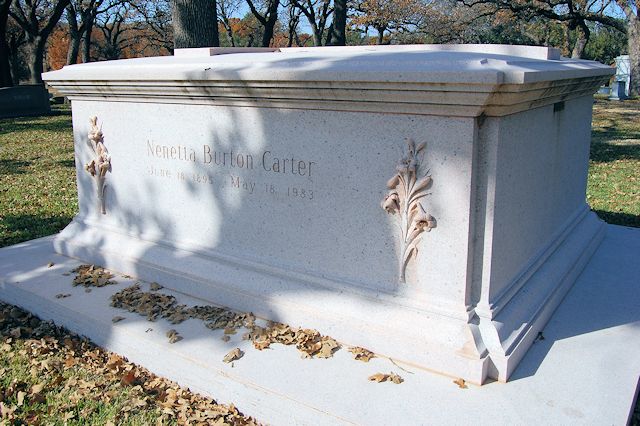
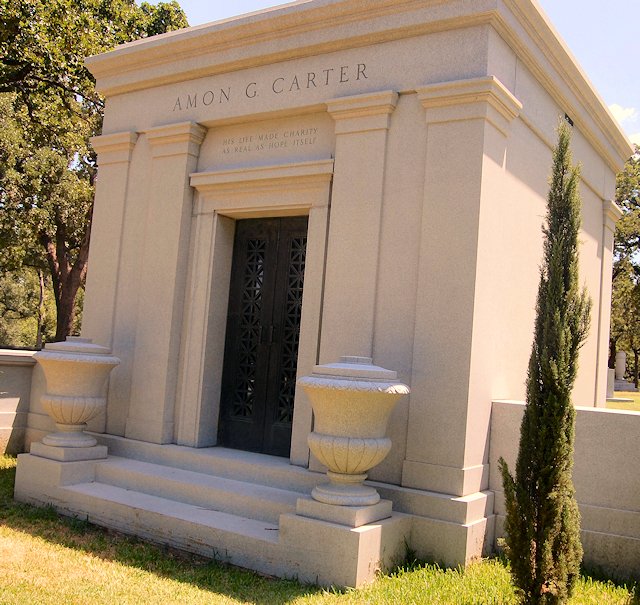 In Amon Carter’s audience were two spirits who did not laugh at his joke: Nenetta Burton Carter (wife 2) and Minnie Meacham Carter (wife 3/widow). The two women were standing at least one hundred feet apart. Nonetheless, the two blushed and muttered darkly, in unison, “Remember, Amon: Hell hath no fury.”
In Amon Carter’s audience were two spirits who did not laugh at his joke: Nenetta Burton Carter (wife 2) and Minnie Meacham Carter (wife 3/widow). The two women were standing at least one hundred feet apart. Nonetheless, the two blushed and muttered darkly, in unison, “Remember, Amon: Hell hath no fury.”
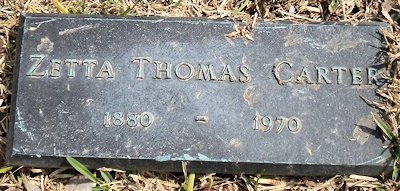 Likewise, thirty miles away in Dallas’s Restland Memorial Park, Zetta Thomas Carter (wife 1) blushed and muttered darkly, “Remember, Amon: Hell hath no fury” but had no idea why she had said it.
Likewise, thirty miles away in Dallas’s Restland Memorial Park, Zetta Thomas Carter (wife 1) blushed and muttered darkly, “Remember, Amon: Hell hath no fury” but had no idea why she had said it.
As the rest of Greenwood’s assembled spirits laughed at Carter’s joke they began to grasp their circumstances: They were dead and yet could think and feel—and laugh. They had no body but could see, hear, talk, move about.
They looked around at each other. So many people. They stood elbow to elbow but had no elbows.
Bailey: “Folks, now let me introduce our emcee for the night. He’s an old Fort Worth boy, born here and buried here, and you all know him from television. Rod Roddy!”
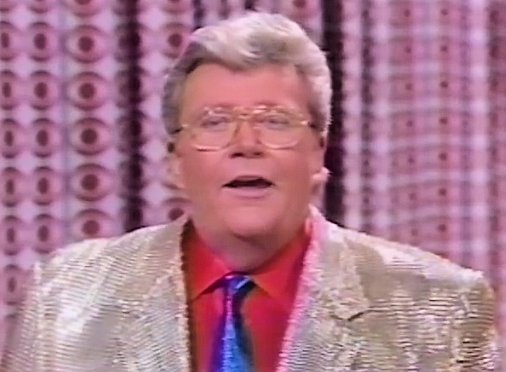 Amid applause Rod Roddy, wearing a bright sequined jacket and electric blue tie, walked to Bailey’s side and began to intone:
Amid applause Rod Roddy, wearing a bright sequined jacket and electric blue tie, walked to Bailey’s side and began to intone:
“Thank you, Bob Barker. . . . Sorry. Habit. Thank you, Mr. Bailey. Ladies and gentlemen, make the most of this Halloween Hoedown. Find your family members. Greet old friends, make new ones. Tonight our food and music will be provided by a few of Greenwood’s own residents. We thank them. Eat all you want because you won’t put on a pound. Dance as if you were lighter than air because tonight you are! I will make public announcements as needed throughout the night. We all have to be back in our eternal resting places by midnight. I’ll let you know when the party’s over.”
Amon Carter, firing his pistols: “Yippie for Fort Worth, yippie for Greenwood, yippie for Halloween!”
After Carter drifted away from Turner’s Oak, Nenetta Burton Carter and Minnie Meacham Carter as discreetly as they could caught up with him. Each taking an elbow he did not have, Nenetta and Minnie frogmarched Amon behind the nearest crypt and pointed out to him—in stereo—the fact that he had embarrassed them in public.
Carter ducked his head defensively: “Jeez, ladies, it was just a joke. You’re nagging me in death for joking that you nagged me in life! Gimme a break. What part of ‘Till death do us part’ don’t you understand?”
 Meanwhile, elsewhere around the cemetery, as the thousands of other spirits dispersed from Turner’s Oak and began to search for loved ones among the throng, on duty to help them were the spirits of six funeral directors who had buried many of the Greenwood population before they, too, had been buried in Greenwood: Ray Crowder, Quincy Adams Harveson, Grover Cleveland Cole, Guy Thompson, Louis P. Robertson, and John Morton Ware.
Meanwhile, elsewhere around the cemetery, as the thousands of other spirits dispersed from Turner’s Oak and began to search for loved ones among the throng, on duty to help them were the spirits of six funeral directors who had buried many of the Greenwood population before they, too, had been buried in Greenwood: Ray Crowder, Quincy Adams Harveson, Grover Cleveland Cole, Guy Thompson, Louis P. Robertson, and John Morton Ware.
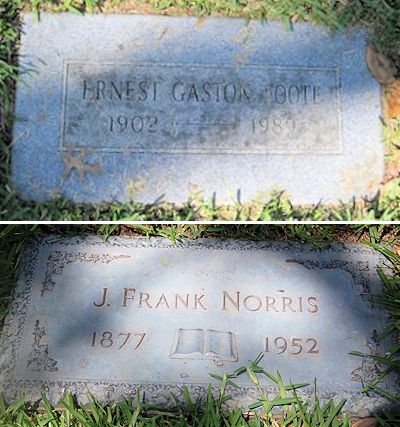 Also present were two men who had spoken at the funerals of many Greenwood residents: Gaston Foote of First Methodist Church and J. Frank Norris of First Baptist Church.
Also present were two men who had spoken at the funerals of many Greenwood residents: Gaston Foote of First Methodist Church and J. Frank Norris of First Baptist Church.
 Meanwhile, positioned around the cemetery were five resident musicians to provide entertainment:
Meanwhile, positioned around the cemetery were five resident musicians to provide entertainment:
Tex Beneke opened his set with “Chattanooga Choo Choo” and soon had dozens of couples dancing.
William J. Marsh played “Texas, Our Texas” as hundreds sang along, and then he lapsed into stately organ music.
Billy Muth, master of the mighty Wurlitzer pipe organ at the Worth Theater, opened with “Hooray for Hollywood” and then played theme songs from popular movies of the past.
Van Cliburn began his concert with Tchaikovsky’s “Piano Concerto No. 1.”
And near the cemetery entrance Frank Maco began his set with the trumpet solo from Schubert’s “Serenade.”
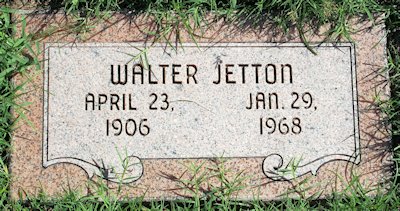 As spirits visited and couples danced, near Turner’s Oak Walter Jetton served up the barbecue that had made him LBJ’s favorite caterer. As hungry spirits holding paper plates formed a line, Jetton heaped each plate with barbecue, ribs, ranch beans, cornbread, potato salad, coleslaw.
As spirits visited and couples danced, near Turner’s Oak Walter Jetton served up the barbecue that had made him LBJ’s favorite caterer. As hungry spirits holding paper plates formed a line, Jetton heaped each plate with barbecue, ribs, ranch beans, cornbread, potato salad, coleslaw.
As Jetton sliced meat he said to one spirit, “The good Lord fed five thousand with five loaves and two fish. Now”—glancing upward—“no sacrilege meant, Lord, but this is Texas, and we eat beef. And tonight I’m gonna feed eighty-two thousand with my bottomless barbecue pit.”
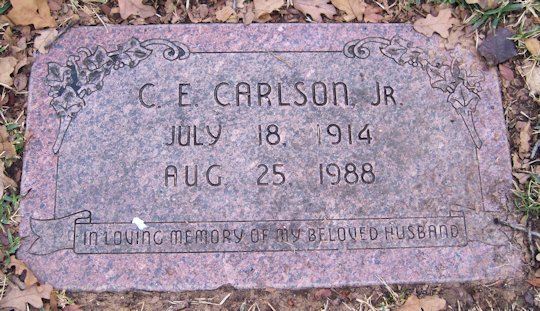 Meanwhile Carl Carlson served Bakon Burgers, which were especially popular among the teenaged dead.
Meanwhile Carl Carlson served Bakon Burgers, which were especially popular among the teenaged dead.
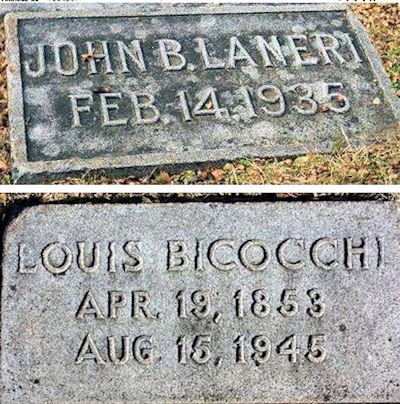
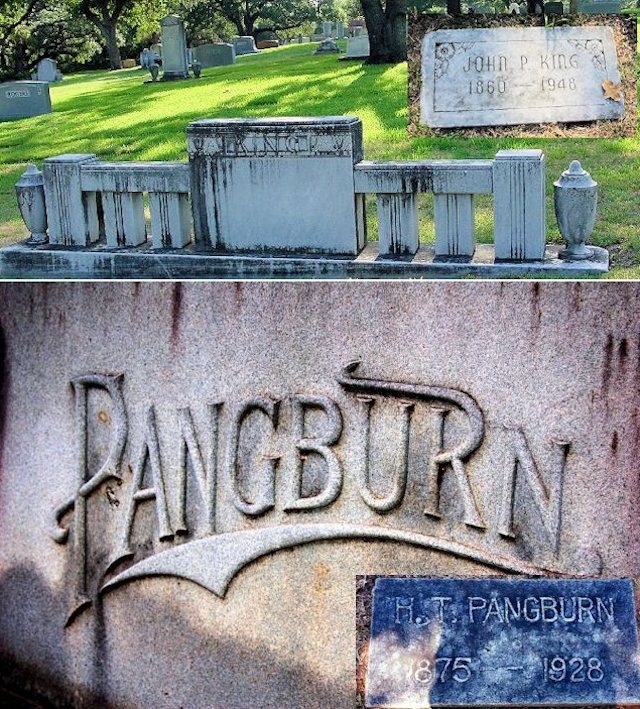 Nearby Louis Bicocchi and John Laneri served pasta; Hugh Pangburn and John King served candy and ice cream.
Nearby Louis Bicocchi and John Laneri served pasta; Hugh Pangburn and John King served candy and ice cream.
 And Ninnie Baird served cupcakes, honey buns, cinnamon rolls, and the like.
And Ninnie Baird served cupcakes, honey buns, cinnamon rolls, and the like.
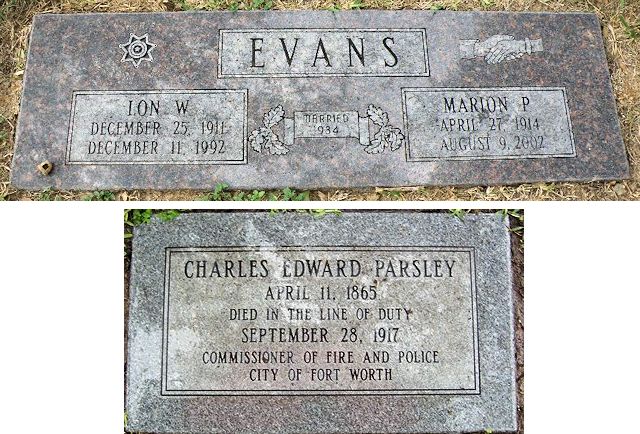 Keeping the peace among the eighty-two thousand spirits were Sheriff Lon Evans and Police Commissioner Charles Edward Parsley.
Keeping the peace among the eighty-two thousand spirits were Sheriff Lon Evans and Police Commissioner Charles Edward Parsley.
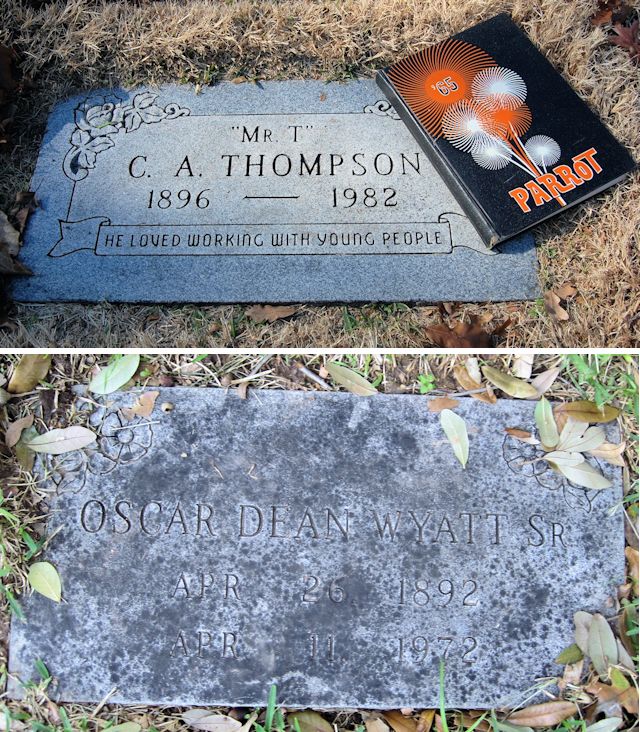 Keeping an eye on the dead teenagers were principals C. A. Thompson of Poly High School and O. D. Wyatt of Paschal High School.
Keeping an eye on the dead teenagers were principals C. A. Thompson of Poly High School and O. D. Wyatt of Paschal High School.
Around the cemetery, spirits, their paper plates heavy with good food, their hearts light with good music and fellowship, quickly began to find familiar faces. There were smiles of recognition and warm handshakes.
Thousands of family members had joyous reunions. Great-grandparents hugged their great-grandchildren as the two generations met for the first time. Spouses were reunited. Sisters embraced brothers who had been killed in wars.
Spirits were reunited with neighbors, school classmates, business associates, friends.
Many spirits used this Halloween night as a second chance to say to loved ones in death what they had failed to say in life.
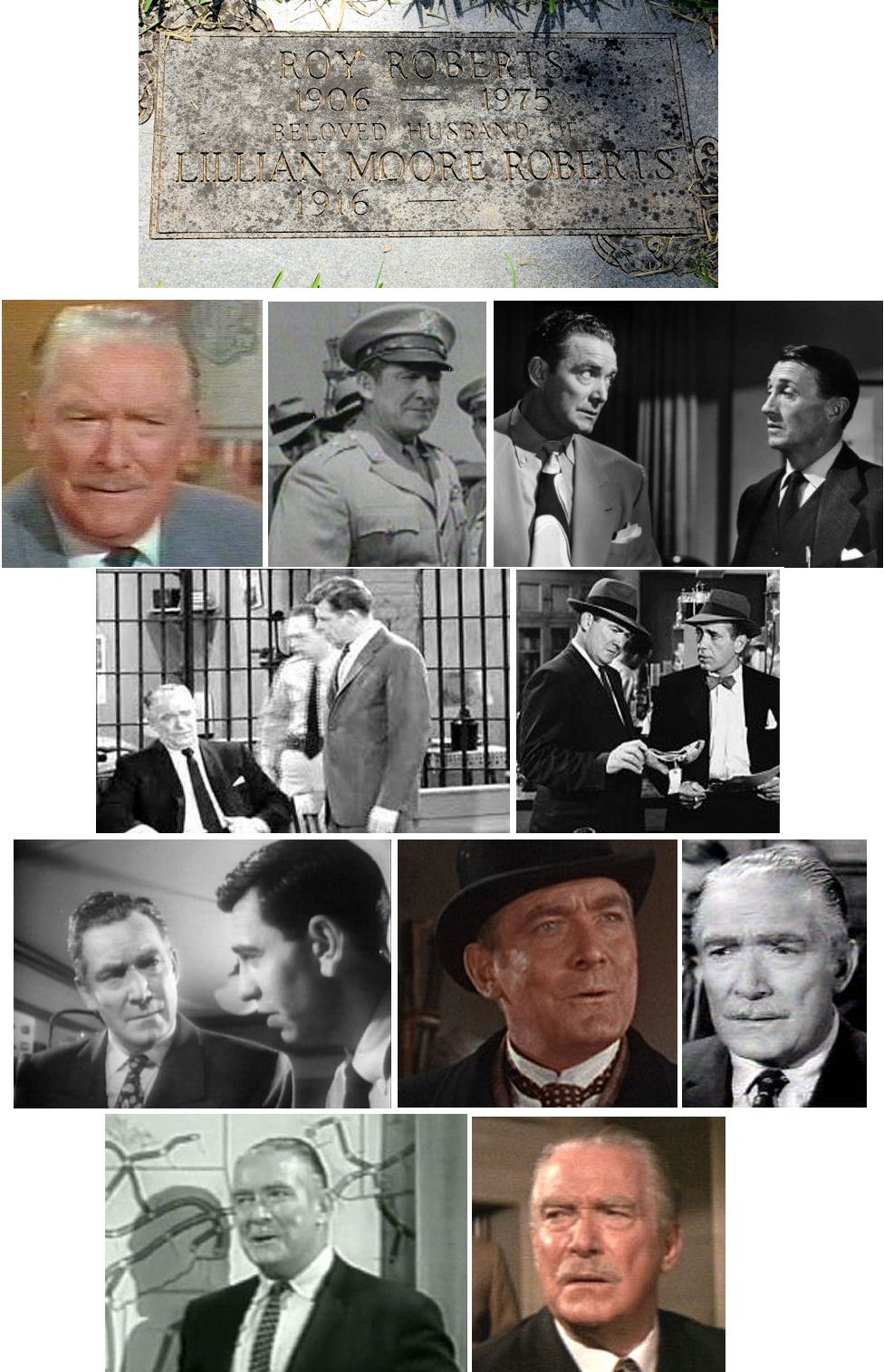 A few faces were familiar to everyone. Such as the ubiquitous character actor Roy Roberts, who signed autographs and told his fans about working with Andy Griffith and Bogart and Vincent Price.
A few faces were familiar to everyone. Such as the ubiquitous character actor Roy Roberts, who signed autographs and told his fans about working with Andy Griffith and Bogart and Vincent Price.
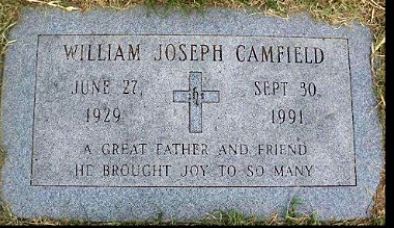 Another familiar face was that of Bill Camfield.
Another familiar face was that of Bill Camfield.
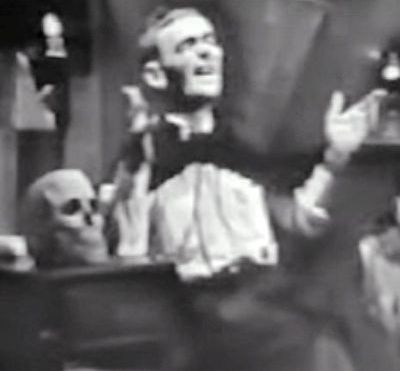 Camfield began the night by skulking about the cemetery dressed as his Gorgon character from his TV program Nightmare. But he soon realized that dead folks don’t scare easily.
Camfield began the night by skulking about the cemetery dressed as his Gorgon character from his TV program Nightmare. But he soon realized that dead folks don’t scare easily.
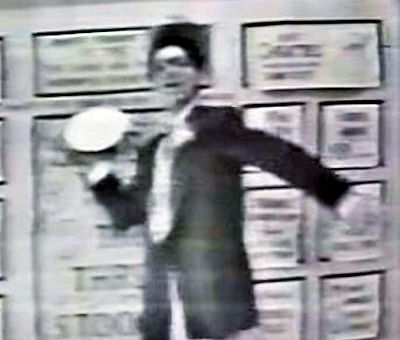 So, Camfield switched to his Icky Twerp character and, to the great amusement of the other spirits, circulated about the cemetery poised to throw a meringue pie into someone’s face.
So, Camfield switched to his Icky Twerp character and, to the great amusement of the other spirits, circulated about the cemetery poised to throw a meringue pie into someone’s face.
By the time Amon Carter went through Walter Jetton’s food line Jetton had served sixty-four thousand spirits from his bottomless barbecue pit.
As Jetton began loading up a paper plate for Carter, Carter watched Jetton scoop up a mound of coleslaw.
“Hold your horses, Walter. You know I don’t eat vegetables. And I hate coleslaw.”
“LBJ ate his coleslaw,” Jetton said, baiting Carter.
“I don’t give a good Gawd da—sorry. Habit.”
Carter took the plate from Jetton but sneered at the mound of coleslaw and walked away muttering, “What’s the good of being dead if you have to eat coleslaw?”
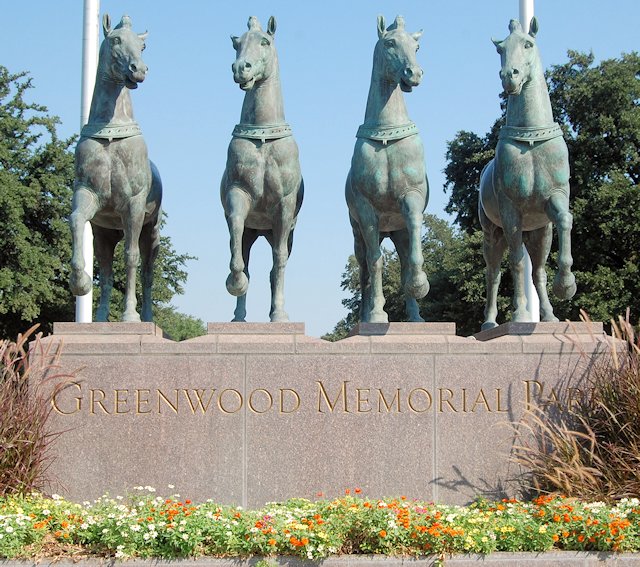 In the night sky the Cheshire cat smile of a crescent moon dimly illuminated the four bronze statues of horses at the entrance to the cemetery.
In the night sky the Cheshire cat smile of a crescent moon dimly illuminated the four bronze statues of horses at the entrance to the cemetery.
Performing nearby, musician Frank Maco saw the four horses and wondered . . .
He began playing “Call to the Post” on his trumpet. As he played he watched the four horses closely. Suddenly their bronze exterior softened and became flesh. Ears twitched, nostrils flared. The four horses came to life, shook their manes, stretched their legs, leaped from their pedestal, kicked up their rear hooves, and galloped across the cemetery, thundering through the thousands of spirits without rustling a single shroud.
Yes, on this Halloween night even the four horses of Greenwood were alive.
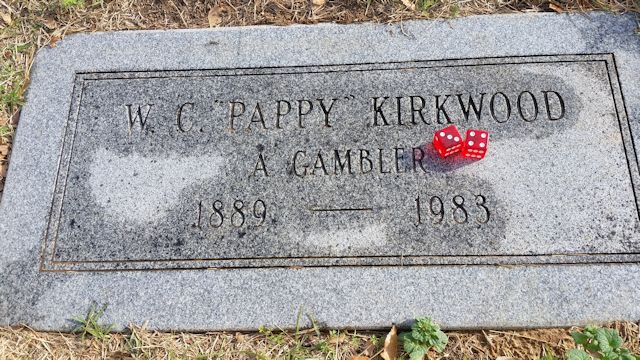 Not far away the spirit of gambler W. C. “Pappy” Kirkwood was shooting dice with the spirits of some fellow gamblers who had frequented his Four Deuces club on Jacksboro Highway.
Not far away the spirit of gambler W. C. “Pappy” Kirkwood was shooting dice with the spirits of some fellow gamblers who had frequented his Four Deuces club on Jacksboro Highway.
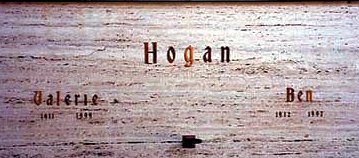 Meanwhile, a crowd of golf fans watched Ben Hogan hit chip shots into an open grave from fifty yards out.
Meanwhile, a crowd of golf fans watched Ben Hogan hit chip shots into an open grave from fifty yards out.
 Not far away baseball fans watched as six minor and major league baseball players—Bobby Bragan, Clarence Kraft, Edward “Big Ed” Konetchy, Bill McCahan, John Adams “Jackie” Tavener, and Pete Donohue—played a game of pepper.
Not far away baseball fans watched as six minor and major league baseball players—Bobby Bragan, Clarence Kraft, Edward “Big Ed” Konetchy, Bill McCahan, John Adams “Jackie” Tavener, and Pete Donohue—played a game of pepper.
About 10 p.m. Amon Carter was talking with a group of dead civic leaders when he saw Nenetta Burton Carter and Minnie Meacham Carter talking to a third spirit. But Carter’s view of the third spirit was obscured by a tall marble monument. As Amon watched, Nenetta and Minnie turned and looked right at him, pointed at him, then turned back to the unseen third spirit, to whom they gave the thumbs-up sign.
Then the two dead women walked away together, their heads leaning toward each other as they talked in hushed tones and laughed.
Curious and vaguely apprehensive, Carter hurried to the tall marble monument, but when he got there, he found no one.
At 10:13 Rod Roddy announced: “Your attention, please. Mrs. Doreen Mathis, 1917-1996, your son Timmy, 1937-1948, is lost and looking for you. You can claim him at Turner’s Oak.”
 As always happens at such social gatherings, cliques formed. Merchants W. C. Stripling, Marvin and O. B. Leonard, Henry Clay Meacham, William Monnig, George Haltom, Thomas B. Ellison, Ray Nixon (The Fair), and R. E. Cox talked shop.
As always happens at such social gatherings, cliques formed. Merchants W. C. Stripling, Marvin and O. B. Leonard, Henry Clay Meacham, William Monnig, George Haltom, Thomas B. Ellison, Ray Nixon (The Fair), and R. E. Cox talked shop.
 As did aviator Ormer Locklear, the British Royal Flying Corps pilots killed at Camp Taliaferro, and pioneer female flier Lillian Moore Roberts.
As did aviator Ormer Locklear, the British Royal Flying Corps pilots killed at Camp Taliaferro, and pioneer female flier Lillian Moore Roberts.
By 10:30 p.m. the four horses of Greenwood had galloped themselves out to a trot and were giving horseback rides to any and all of the dead.
At 11:16 Rod Roddy announced: “Your attention, please. Someone just handed in to Lost and Found two shrouds: one a man’s, size 44, and the other a woman’s, size 6. Folks, what happens in Greenwood stays in Greenwood, but remember: Let’s keep the hereafter rated PG.”
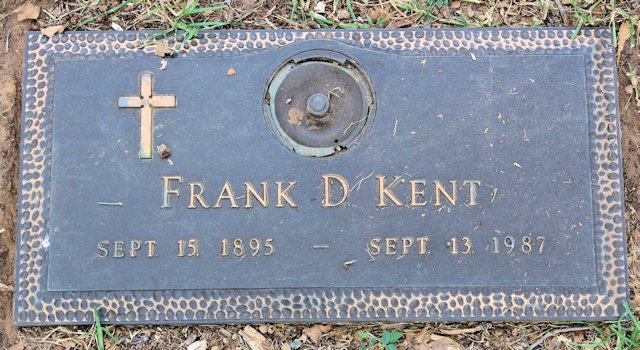 At 11:23 Amon Carter stood talking with Cadillac dealer Frank Kent.
At 11:23 Amon Carter stood talking with Cadillac dealer Frank Kent.
Carter had given no further thought to the mysterious tryst between Nenetta Burton Carter, Minnie Meacham Carter, and an unseen third spirit.
“I had a thirty-three Caddy,” Carter said to Kent.
Carter did not notice that Frank Kent kept looking over Carter’s shoulder.
“It was a V8,” Carter said. “I wanted the V16, but—”
Frank Kent stifled a giggle.
“What’s so funny?”
Rather than answer, Frank Kent took a quick step backward as Icky Twerp suddenly reached around from behind Carter and pushed the meringue pie into his face.
As Carter sputtered, an onlooker yelled, “Amon, your face is as white as a ghost!”
Nenetta and Minnie slapped palms in an ethereal high-five and shouted, in unison, “Yippie for just deserts!”
Thirty miles away in Dallas’s Restland Memorial Park, first wife Zetta Thomas Carter thrust her palm into the air and shouted, “Yippie for just deserts!” but had no idea why she did so.
Amon Carter suffered the gotcha with good humor. As he wiped meringue from his face, he stuck a gooey finger into his mouth.
“Beats coleslaw.”
By 11:58 eighty-two thousand spirits were pleasantly exhausted, replete with good food, good music, and good fellowship.
Then, at 11:59, Rod Roddy stood on his grave, cleared his throat, and intoned:
“Ladies and gentlemen, at midnight the party is over. . . .”
A minute later Rod Roddy’s translucent form evaporated, and his spirit descended into his grave as he boomed out in his TV game show announcer’s voice:
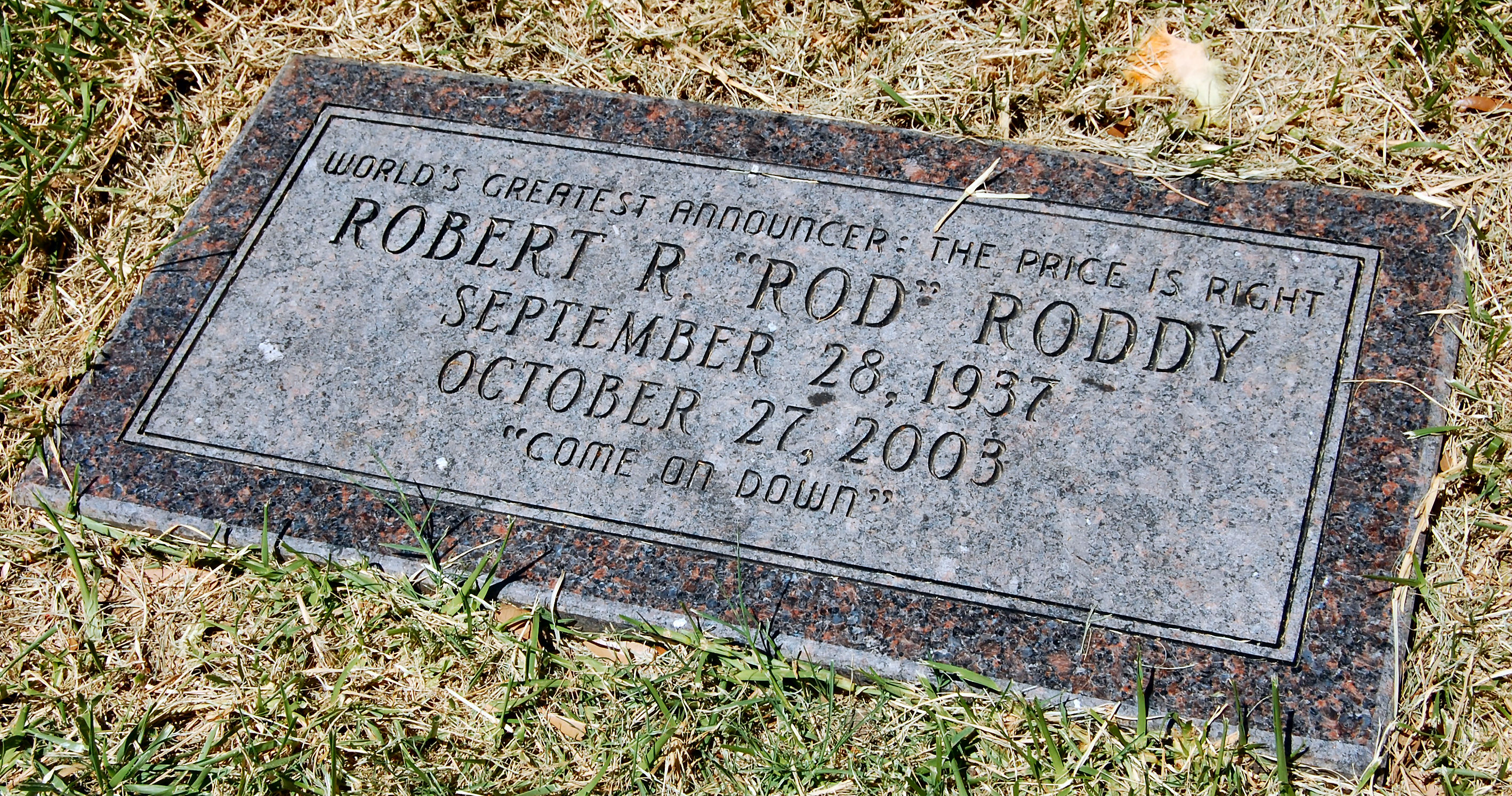 “Come on down!”
“Come on down!”
The eighty-two thousand spirits of Greenwood Cemetery came on down, returning to their graves and urns.
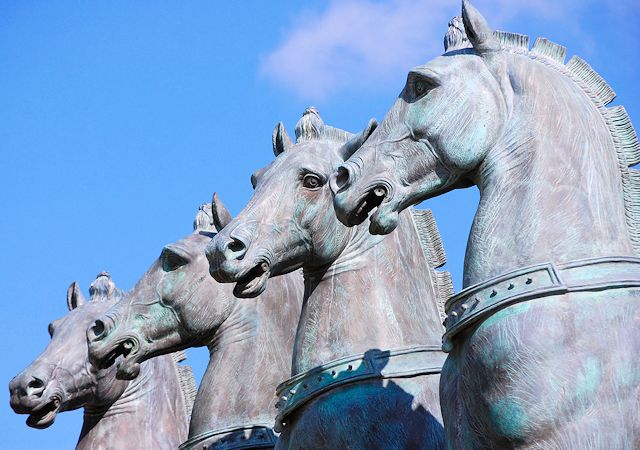 At the same time, the four horses of Greenwood returned to their pedestal at the entrance to the cemetery. They resumed their pose and were again bronze and inanimate.
At the same time, the four horses of Greenwood returned to their pedestal at the entrance to the cemetery. They resumed their pose and were again bronze and inanimate.
Fast-forward seven hours. Just after dawn this morning the caretaker arrived at Greenwood and unlocked the gates of the main entrance on White Settlement Road. The floodlights that illuminate the four horses were still on. As he passed the four horses the caretaker did not notice that their bronze flanks glistened in a coat of sweat.
A half-hour later, on the north side of the cemetery, in front of the bronze-and-glass door of a cream-colored granite crypt, the caretaker found a greasy paper plate topped by an untouched mound of coleslaw.
He stooped and picked up the paper plate. As he stood he noticed words scrawled on the glass of the crypt door.
The caretaker squinted at the message and asked himself: Now why would anyone wanna write on a crypt door—and backwards at that?
Only later would it dawn on him:
 The message had been written on the inside of the glass.
The message had been written on the inside of the glass.
Y’all Hallows’ Eve (Part 1): Night of the Living Blog Post (Mwa-ha-ha-ha-ha)
Y’all Hallows’ Eve (Part 2): Words That Go (Goose)Bump in the Night
Y’all Hallows’ Eve (Part 3): Ghoulies and Ghosties and Long-Leggedy Beasties
Posts About Cemeteries
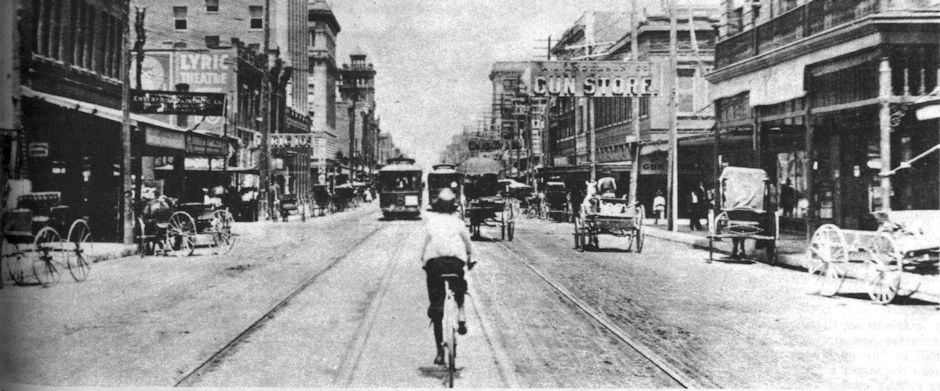





Can’t help but love a good sense of history and humor. You got your tongue firmly planted in your cheek.
Thanks, Julie. A heap o’ history buried at that cemetery.
I’m not an Halloween fan, but this was entertaining. You didn’t miss too many “old names.”
Thanks, Jesse.
We always appreciate this, thanks. I’m going to share the link with my ex-pat (ex-Tex?) buds in MA and CA; they will get it.
Thanks, Sharon.
This was a most entertaining post today about the ghoulish gala of the year. You were even more clever with your words than (para)normal. I especially enjoyed Rod’s immortal words at 11:59, “Come on down!” Thanks, Mike
Thanks, Billy Joe. I had a lot of fun with that one.